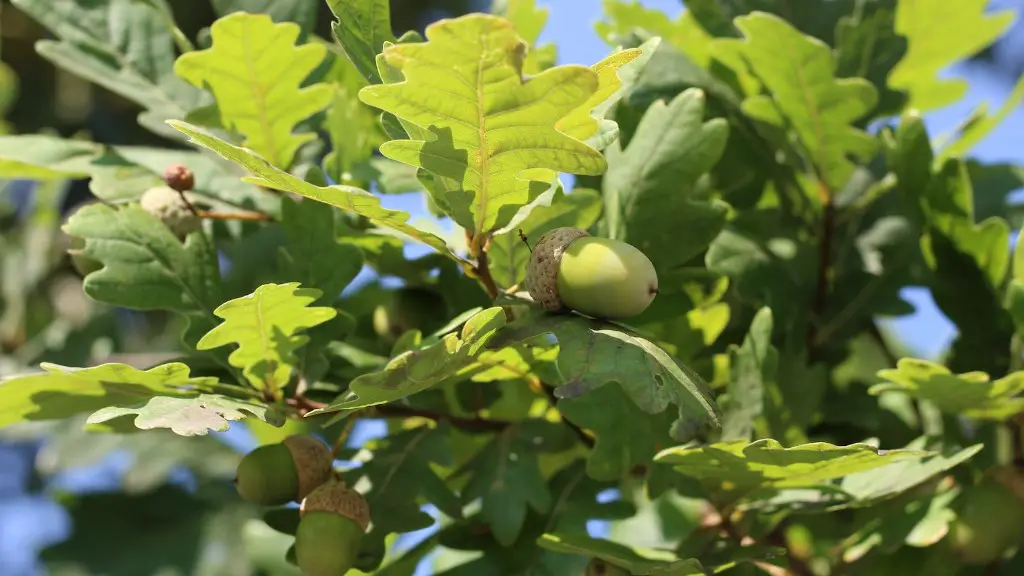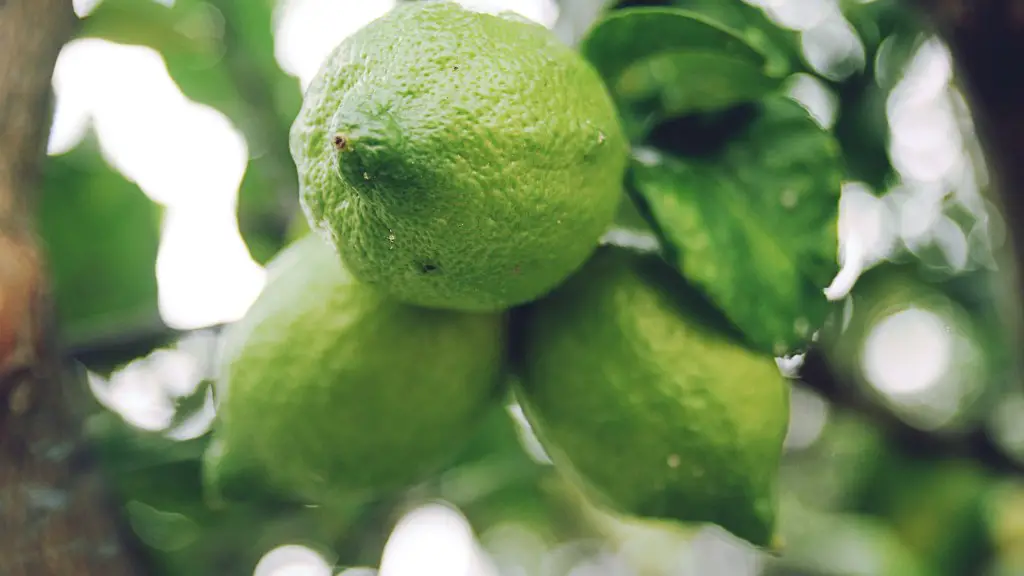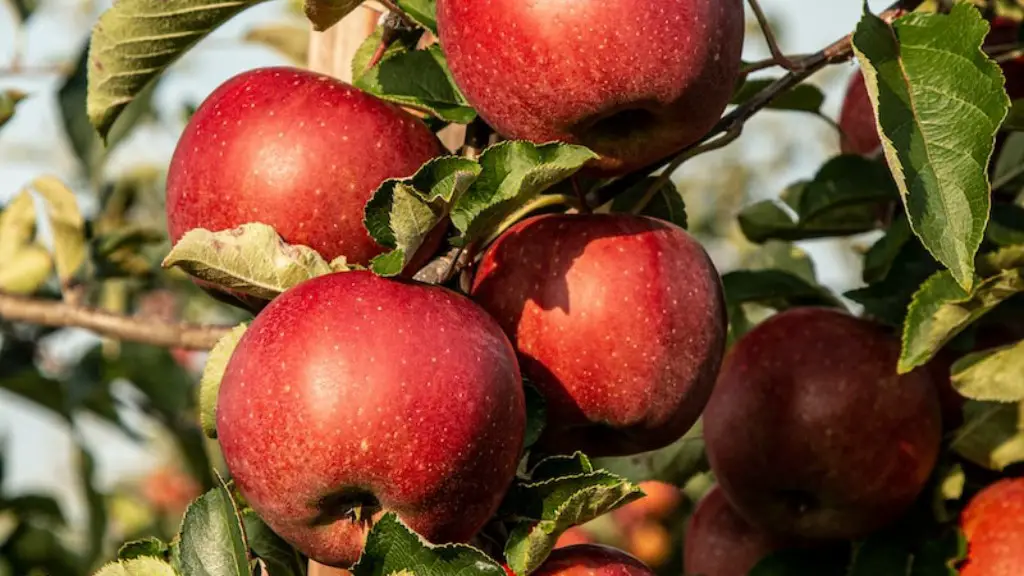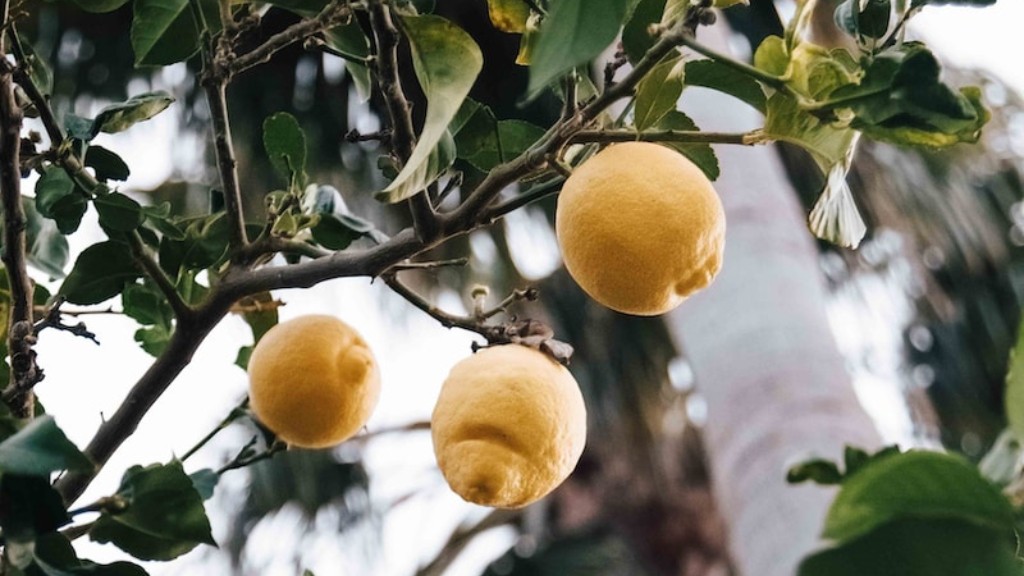Limes and lemons are both members of the citrus family, however, they are two different fruits. The lime tree (Citrus aurantiifolia) is native to Southeast Asia, while the lemon tree (Citrus limon) is native to either India or China. The lime and lemon trees are very different in size and shape, and they produce two fruits that are very distinct in color, aroma, and taste.
Limes typically have a green outer skin, while the lemons have more of a yellowish hue. Both limes and lemons can range in size from very small to very large, but generally, limes are usually smaller and rounder in shape than lemons, which tend to be oval.
The aroma of limes is much more pungent than lemons, in terms of both the skin and the juice. Similarly, the tartness of limes is much more intense than that of lemons. Lime juice is most often used to add flavor to food or drinks, while lemon juice is preferred for baking.
The major difference between a lime tree and a lemon tree is that a lime tree must be pollinated in order to bear fruit and produce limes, while a lemon tree is self-pollinating and can bear fruit without the need for human intervention. Additionally, a lime tree can reach a height of 20 feet, while the lemon tree can reach 40 feet when fully mature. The leaves of the lime tree are light green and small, while the leaves of the lemon tree are dark green and larger.
Despite their differences, the limes and lemons that are produced by the lime and lemon tree are both acidic fruits with countless uses, both culinary and medicinal. For example, lime juice has been used in many cultures as a home remedy to treat acne, while lemon juice is believed to help prevent dehydration.
Nutritional Benefits of Limes and Lemons
Both limes and lemons are rich in Vitamin C, a nutrient essential for maintaining healthy eyes, skin, and bones. They are also a good source of dietary fiber, which helps support digestion and overall health. Furthermore, limes and lemons are low in sugar, making them an excellent snack for people who are trying to watch their sugar intake. Furthermore, limes and lemons are high in antioxidants and can help protect the body from damage caused by free radicals.
In addition to their nutritional benefits, limes and lemons have been used for their medicinal benefits for centuries. For instance, both limes and lemons are believed to have anti-inflammatory and anti-viral properties, which can help fight off colds and flu. Additionally, both fruits contain a high amount of citric acid, which can help break down fat cells and boost the body’s metabolism.
In terms of culinary uses, limes and lemons can both be used to add flavor to various dishes. For example, lime juice can be added to guacamole to enhance its flavor, while lemon juice can be used to make a delicious lemonade. Additionally, limes and lemons can both be added to baking recipes to enhance the flavor of cakes, cookies, pies, and more.
Growing Lime and Lemon Trees
Lime and lemon trees can both be grown in a variety of climates, as long as they receive plenty of sunlight and adequate drainage. In terms of soil, lime and lemon trees prefer slightly acidic soil that is well-draining. Additionally, both lime and lemon trees require consistent moisture in order to produce healthy fruits.
Prune lime and lemon trees during the winter months to keep them healthy and encourage new growth. Furthermore, lime and lemon trees should be fertilized with a balanced fertilizer two to three times a year. Additionally, make sure to water the trees deeply, as they need a lot of water to stay healthy.
When it comes to harvesting, limes can be picked when they are still slightly green, while lemons should be left on the tree until they are fully yellow. The fruits should be plucked from the tree using pruning shears or gardening gloves.
Overall, limes and lemons, although members of the same family, are two different fruits with distinct characteristics. From their size and shape to their color, aroma and taste, limes and lemons are vastly different.
Preservation for Limes and Lemons
If you are looking to preserve your limes or lemons for longer periods, there are some methods that you can use. For instance, limes and lemons can be frozen in an airtight freezer bag. Additionally, you can store limes and lemons in the refrigerator in an airtight container.
Alternatively, you can make your own lime or lemon juice and freeze it in an ice cube tray. This will allow you to quickly use the cubes when needed. Furthermore, limes and lemons can be dehydrated in a food dehydrator or an oven and stored for a longer period.
If you are looking for a longer-term storage solution for limes and lemons, you can make a lime or lemon syrup. To do this, combine equal parts of freshly squeezed lime or lemon juice and white sugar in a saucepan. Bring toboil then reduce the heat and simmer until the syrup is syrupy. After it cools, you can store the syrup in a glass jar in a cool, dark place for up to 5 months.
Finally, limes and lemons can also be preserved by pickling them. To do this, you can fill a mason jar with the fruits and cover them with a mixture of vinegar, water, and spices such as dill, allspice and garlic. Let the jar sit overnight, and then place in the refrigerator. This method will keep the limes and lemons pickled for up to three months.
Health Benefits of Limes and Lemons
The health benefits of limes and lemons are widely celebrated, as they are abundant in vitamin C, dietary fiber and antioxidants. Vitamin C is an important nutrient for maintaining healthy eyes, skin and bones, and may even help boost the immune system. In addition to their high vitamin C content, limes and lemons are also rich in dietary fiber, which helps support digestion and overall health.
Research has shown that the consumption of limes and lemons may also help protect the body from disease. For example, a study published in the American Journal of Clinical Nutrition suggests that lemons may help lower the risk of stomach cancer. Similarly, limes have shown to be beneficial in reducing the risk of diabetes and heart disease.
Furthermore, the citric acid in limes and lemons may help break down fat cells and boost the body’s metabolism, leading to greater weight loss. Additionally, both limes and lemons contain certain compounds that may help reduce inflammation and boost the immune system.
When it comes to skin health, lemons and limes may help improve complexion and reduce the signs of aging. Lemons, in particular, are rich in Vitamin C, which can help boost collagen production and reduce wrinkles. Additionally, lemons may help reduce acne as they contain citric acid and Vitamin C, which are both beneficial for treating blemishes.
Finally, limes and lemons can also be used to help treat digestive issues. Drinking warm water with lemon juice can help reduce heartburn and indigestion. In addition, the citric acid in limes and lemons can help break down fats and proteins, making them easier to digest.
Culinary Applications of Limes and Lemons
Limes and lemons are two of the most popular and versatile ingredients in the kitchen. While both fruits can be used to add flavor to beverages and sweet desserts, they can also be used in a variety of savory dishes.
For example, lime juice can be added to stir-frys to brighten the flavors, while lemon juice can be used to make delicious marinades for meats. Additionally, limes and lemons are great for adding a zesty kick to salads and dressings. Furthermore, lime and lemon zest can be used to add flavor to baked goods and other dishes.
When it comes to drinks, limes and lemons can both be used to make delicious drinks. For instance, lime juice can be used to make mojitos or margaritas, while lemon juice can be used to make lemonade or iced tea. Moreover, limes and lemons can be used to make delicious mocktails, such as a raspberry lemonade or limeade.
Overall, despite their differences, limes and lemons are two of the most popular and versatile ingredients in the kitchen. They can be used to add flavor to a variety of dishes, and they also provide a number of health benefits.





